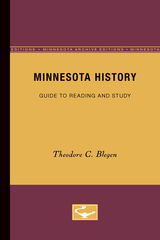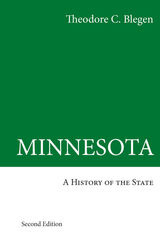
Grass Roots History was first published in 1947. Minnesota Archive Editions uses digital technology to make long-unavailable books once again accessible, and are published unaltered from the original University of Minnesota Press editions.
The pivot of history is not the uncommon, but the usual, and the true makers of history are "the people, yes."
Theodore C. Blegen, writing with discernment and vigor, explores in his book the simple essence of grass roots history, the colors and forms and the processes of our daily life and civilization. He uses diaries and letters, songs and ballads of the immigrants and pioneers, everyday speech, and newspaper advertisements to show clearly and sharply the exciting sources of "the literature of the unlettered," to reveal the spirit of the day, and to reconstruct for the reader a segment of the American past.
"We have need to dig into the folk story of America if we are to bring out the pattern of American development and American culture in all its color and richness of texture and design. Grass roots history is an avenue to that 'social awareness' which the natural scientists, more boldly than the social scientists, have declared to be the most urgent and compelling need of our day."
This is the author's own statement of the significance of grass roots history.

Minnesota History was first published in 1931. Minnesota Archive Editions uses digital technology to make long-unavailable books once again accessible, and are published unaltered from the original University of Minnesota Press editions.

Minnesota History was first published in 1960. Minnesota Archive Editions uses digital technology to make long-unavailable books once again accessible, and are published unaltered from the original University of Minnesota Press editions.
Anyone interested in Minnesota history, whether as a teacher, as a student, or as a general reader, will find this an invaluable guide to reading and study. The book contains an outline of the state's history, questions and suggestions for the student, and lists of reading material for each of the 42 topical sections into which the outline is divided.
The outline covers the entire history of the state from the time of the Indians, before the French and British explorations, to the present. The reading references include accounts written from the seventeenth through the twentieth centuries. The aim in preparing the reading lists was to include any article or book bearing upon the Minnesota story which met the qualifications of good historical writing and fair accessibility. Materials of particular interest or importance to the topic under consideration are so designated, and there are liberal annotations to help the reader in his choice of readings. References which are particularly appropriate for young readers are also specially designated. A number of maps are provided for additional guidance.
This is a complete revision of a book long out of print, Minnesota History: A Study Outline by Theodore C. Blegen.

Land of Their Choice was first published in 1955. Minnesota Archive Editions uses digital technology to make long-unavailable books once again accessible, and are published unaltered from the original University of Minnesota Press editions.
This collection of "American letters" that immigrants wrote to friends and relatives in the lands they had left tells a little-known human story that is part of the larger saga of America. It constitutes a kind of composite diary of everyday people at the grass roots of American life.
The letters published here, written by Norwegian immigrants in the middle of the nineteenth century, are truly representative of a great body of historical material - literally millions of such letters that immigrants of every nationality wrote to the people back home. Describing their journeys, the new country, the problems and pleasures of daily life, the letters afford new insight into the American past and at the same time reflect the image of America that was projected into the minds of Europeans in an era when millions were crossing the seas and moving west.
The letters were written from many different parts of the United States. Many relate the experiences of settlers in the Middle West, particularly in Illinois, Wisconsin, Iowa, and Minnesota. But there are also accounts of pioneer life in Texas and as far away from the Atlantic crossing as California.
The story of Oleana, the ill-fated Utopian project established in Pennsylvania by the famous Norwegian violinist, Ole Bull, is revealed in a collection of letters written by settlers in this project. An English translation of the amusing ballad of Oleana adds verve to this section. Another fascinating portion of the volume is devoted to first-hand accounts of the transatlantic gold rush that drew Norwegians directly by ship from their native land to California in the 1850's.
There are some letters written by leaders in Norwegian-American history, such as Johann
R. Reiersen, who was a well-known newspaper editor in Christianssand, Norway, before he migrated to America, and the Rev. J.W. Dietrichson who sought to establish the Church of Norway on American soil and whose letters, now translated into English for the first time, relate his experiences in Wisconsin.
READERS
Browse our collection.
PUBLISHERS
See BiblioVault's publisher services.
STUDENT SERVICES
Files for college accessibility offices.
UChicago Accessibility Resources
home | accessibility | search | about | contact us
BiblioVault ® 2001 - 2024
The University of Chicago Press









